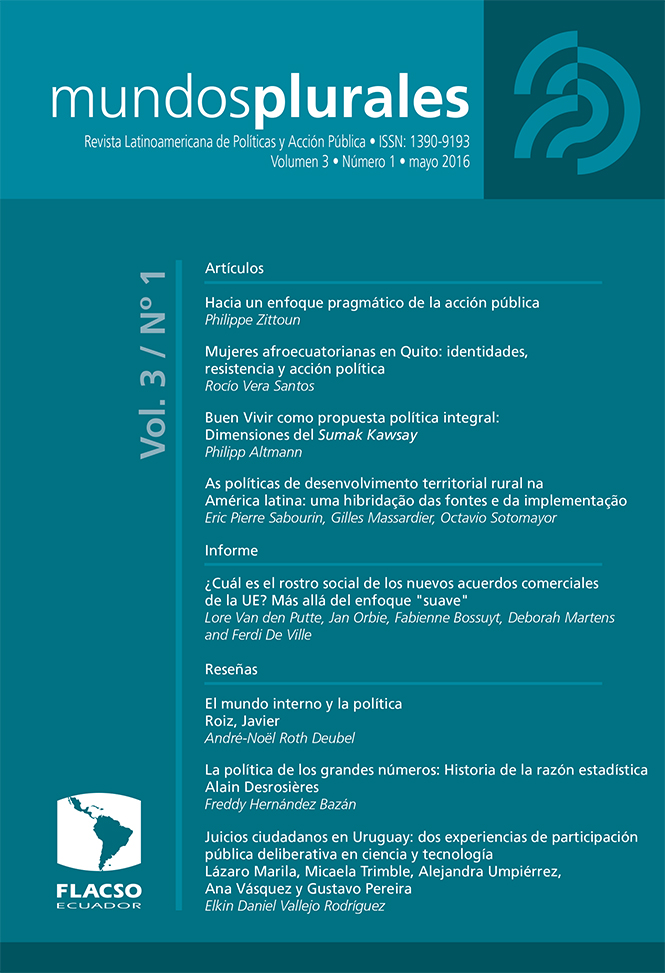¿Cuál es el rostro social de los nuevos acuerdos comerciales de la UE? Más allá del enfoque “suave”
Resumen
Si la UE realmente está comprometida con la promoción de los derechos laborales a través de acuerdos comerciales, debería invertir más personas y recursos en este objetivo y mejorar su enfoque de la vinculación entre comercio y trabajo en tres aspectos: (i) la participación de la sociedad civil en la supervisión debería ser más sustancial; (ii) la supervisión de la ejecución y el seguimiento deben ser más completos, sistemáticos e integradores; (iii) el enfoque basado en el diálogo debe ser más integral tanto en términos de las políticas y la participación de los actores. Estas cuestiones son más importantes que el debate sobre si es apropiado que la UE adopte un enfoque basado más en las sanciones.Descargas
Citas
Council of the European Union (1999) WTO: preparation of the Third Ministerial Conference, Council press release 12121/99, 2209th Council meeting, Luxembourg, 26 October 1999.
De Schutter O. (2011) Guiding principles on human rights impact assessments of trade and investment agreements, addendum the annual report to the General Assembly, New York, United Nations.
European Commission (2001) Communication from the Commission to the Council, the European Parliament and the Economic and Social Committee - Promoting core labour standards and improving social governance in the context of globalization, COM(2001) 416 final, 18 July 2001.
European Commission (2006) Communication from the Commission to the Council, the European Parliament, the European Economic and Social Committee and the Committee of the Regions - Global Europe: competing in the world - A contribution to the EU’s Growth and Jobs Strategy, COM (2006) 567 final, 1 October 2006.
European Commission (2014) Proposal for a regulation of the European Parliament and of the Council setting up a Union system for supply chain due diligence self-certification of responsible importers of tin, tantalum and tungsten, their ores, and gold originating in conflict-affected and high-risk areas, COM(2014) 111 final, 5 March 2014.
European Parliament and Council (2014) Directive 2014/24/EU of the European Parliament and of the Council of 26 February 2014 on public procurement and repealing Directive 2004/18/EC, Official Journal of the European Union, L 94, 28 March 2014.
Ministry of Foreign Affairs of the Netherlands (2013). A world to gain: a new agenda for aid, trade and investment. https://www.government.nl/documents/letters/2013/04/05/global-dividends-a-new-agenda-for-aid-trade-and-investment
Oehri M. (2015) Comparing US and EU labour governance ‘near and far’: hierarchy vs network?, Journal of European Public Policy, 22 (5), 731-749.
Van den Putte L., Bossuyt F., Orbie J. and De Ville F. (2013) Social norms in EU bilateral trade agreements: a comparative overview, in Takacs T., Ott A. and Dimopoulos A. (eds.) Linking trade and non-commercial interests: the EU as a global role model, Den Haag, TMC Asser Institute.
Van den Putte L. and Orbie J. (2015) EU bilateral trade agreements and the surprising rise of labour provisions, International Journal of Comparative Labour Law and Industrial Relations, 31 (3), 263-283.
Los autores/as que publiquen en esta revista aceptan las siguientes condiciones:
- Los autores/as conservan los derechos de autor y ceden a la revista el derecho de la primera publicación, con el trabajo registrado con la licencia de atribución de Creative Commons, que permite a terceros utilizar lo publicado siempre que mencionen la autoría del trabajo y a la primera publicación en esta revista.
- Los autores/as pueden realizar otros acuerdos contractuales independientes y adicionales para la distribución no exclusiva de la versión del artículo publicado en esta revista (p. ej., incluirlo en un repositorio institucional o publicarlo en un libro) siempre que indiquen claramente que el trabajo se publicó por primera vez en esta revista.








